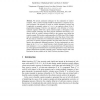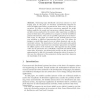109
Voted
FORTE
2004
15 years 2 months ago
2004
This paper describes the tool CASPA, a new performance evaluation tool which is based on a Markovian stochastic process algebra. CASPA uses multi-terminal binary decision diagrams ...
96
Voted
FORTE
2004
15 years 2 months ago
2004
In this paper, we present an approach for modeling an existing web application using communicating finite automata model based on the userdefined properties to be validated. We ela...
112
Voted
FORTE
2004
15 years 2 months ago
2004
Abstract. In this article we present a method to avoid security problems in modern m-commerce applications. The security problems that we are addressing are breaches of security du...
105
Voted
FORTE
2004
15 years 2 months ago
2004
Abstract. We apply the PEPA nets modelling language to modelling a peer-topeer medical informatics application, the FieldCare PDA-based medical records system developed by SINTEF T...
95
Voted
FORTE
2004
15 years 2 months ago
2004
Abstract. Event-based process algebraic specification languages support an elegant specification technique by which system behaviours are described as compositions of constraints o...
104
click to vote
FORTE
2004
15 years 2 months ago
2004
Software Model-Checking and Testing are some of the most used techniques to analyze software systems and identify hidden faults. While software model-checking allows for an exhaust...
103
click to vote
FORTE
2004
15 years 2 months ago
2004
Abstract. We present automated techniques for the explanation of counterexamples, where a counter-example should be understood as a sequence of program statements. Our approach is ...
115
Voted
FORTE
2004
15 years 2 months ago
2004
Passage time densities are useful performance measurements in stochastic systems. With them the modeller can extract probabilistic quality-of-service guarantees such as: the proba...
103
click to vote
FORTE
2004
15 years 2 months ago
2004
Abstract. As its name indicates, NGSCB aims to be the "Next-Generation Secure Computing Base". As envisioned in the context of Trusted Computing initiatives, NGSCB provid...
123
Voted
FORTE
2004
15 years 2 months ago
2004
Abstract. Monitoring large distributed concurrent systems is a challenging task. In this paper we formulate (model-based) diagnosis by means of hidden state history reconstruction,...


